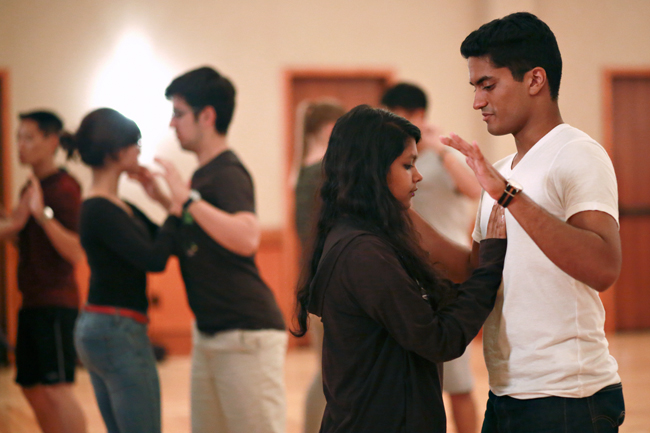Argentinian music drifts from the Quadrangle room on the third floor of the Texas Union, where Tango In Orange, the University’s tango club, meets each week.
The LLILAS Benson Latin American Studies and Collection will host “Celebrating Argentina,” an event to showcase local Argentinian culture, on Thursday. Among the evening events, there will be a lecture on Argentinian tango music, lyrics and dance. Following the lecture, there will be a performance from professional tango dancers Jairehlbi and George Furlong. Attendees can expect a short tango lesson and a reception with Argentinian food and wine.
“Through our Argentine programs, we try to educate the community about current political-social-economic events in Argentina but also raise awareness about cultural Argentinian issues,” scholarly programs director Paloma Díaz-Lobos said. “The idea was to have an event that could reach beyond academia, and we know that there are several people who are enthusiastic about Argentinian culture and tango.”
The lecture will be led by John Turci-Escobar, Butler School of Music assistant professor of music theory, and guest Julio Schvartzman, professor of literature at the University of Buenos Aires.
“They will be talking about the literature of tango to analyze the contents in tango lyrics, the sexisms, the marginality culture and etc. and put light on those issues,” Díaz-Lobos said. “The lyrics, which are extremely hard to understand even sometimes for Spanish-speakers, use local dialect called ‘lunfardo,’ which Argentines spoke in areas of Buenos Aires.”
According to Turci-Escobar, it is believed that Argentinian tango originated among the Buenos Aires working-class, who were immigrants to Argentina in the 19th century.
“Argentine tango is dancing, but, at the same time, it is dancing with a feeling of usually missing a loved one,” said Christopher Tran, mechanical engineering senior and co-president of Tango In Orange. “In historic Argentina, when it was just being colonized, many immigrants left their families in order to come to Argentina. There are a lot of men missing their families, their lives, their children — you really feel that in the music, and you kind of dance to that feeling.”
According to geological sciences senior Keri Belcher, the co-president of Tango in Orange, Argentinian tango is a social dance that creates community.
“It’s a social outlet,” Belcher said. “You have lessons where you go and learn tango, and then you have ‘practicas’ where you go and practice tango, and then you have what is called ‘milongas’ where you go and dance to the rhythm, and I enjoy that.”
Originally, Argentinian tango was almost exclusive to the working class, but, today, there is a phenomenon known as the “tango craze,” where people have become attracted to the culture.
“If you look at any major city in the world, and you look up tango, you will see there are several places to dance,” Turci-Escobar said. “It’s an urban phenomenon.”
Turci-Escobar believes one of the biggest misconceptions people have of tango is thinking it is a hyper-sexualized dance.
“It is not as highly sexualized like the ‘roses, valentino-type tango,’” Turci-Escobar said. “Tango is a more elegant, refined and highly technical skill; it is more inward than outward. It’s a dance where you are looking for a close connection with your partner.”
Argentinian tango became the main topic of the event because Turci-Escobar’s research touched on the subject and because its mystery attracts people.
“All of this came together when we realized one of our faculty member’s latest work has been on tango,” Díaz-Lobos said. “We want to put in the spotlight the research of our faculty members; we want them to connect and we want to build community.”





















